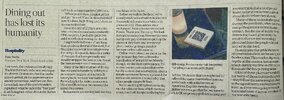wayneL
VIVA LA LIBERTAD, CARAJO!
- Joined
- 9 July 2004
- Posts
- 26,331
- Reactions
- 14,013
I would walk straight out and never go backWhat I read into that is this store refuses or is too lazy and can't be bothered to carry a "float" for the till.
Moreso and probably the case, young staff failing NAPLAN and need a 100 fingers and toes to calculate the correct change.
I get it that processing cash is time consuming but to alienate customers, seems plain silly to me.



